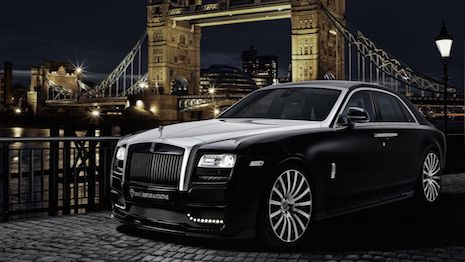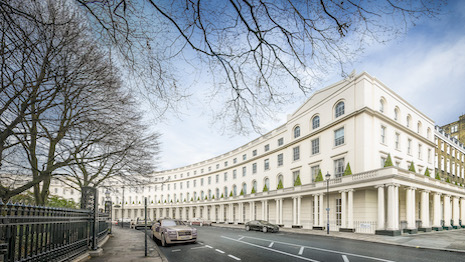While Brexit negotiations still remain at a standstill, the possibility of a future “Light Brexit” is revealing to have a significantly positive impact on British affluent.
According to a report from Euromonitor, those with a disposable income of $75,000 or more will benefit from the healthy economy that a softer Brexit would create. However, the most severe “No-Deal” Brexit could open up the potential for a significant increase in poverty.
"The richest segment of consumers (with a household disposable income over US$75,000) would see the largest expansion in this scenario, as an improved economy results in movement up the income pyramid," said Media Eghbal, head of countries’ analysis at Euromonitor International. "This will enhance discretionary spending prospects by this segment with a US$6.0 billion increase in real terms from the baseline in 2019."
Brexit issues
While light Brexit is only 5 to 15 percent probable, as the United Kingdom and the European Union hash out the final details, this would be the significantly more beneficial outcome to affluent consumers.
Inflation rates would remain below 2 percent, at 1.8 percent annually, which is within the Bank of England’s target.
A Light Brexit would mean that the U.K. would still allow a softened immigration control along with access to the common market and passport rights for the financial sector.
Unfortunately, the more likely outcome will be the No-Deal Brexit scenario in which the U.K. will sever all ties with the E.U.
With Light Brexit, London will remain strong with financial prospects retaining passport rights, likely meaning that affluent consumers will maintain their trust in the city. If a Light Brexit were to occur, London would likely see 39,700 more affluent households in 2019.
The luxury goods sector would also remain strong. Imported goods will see a less harsh impact. British GDP could see a growth of 2.3 percent in 2019 with Light Brexit, compared to a 1.4 percent increase without it.
 Rolls Royce is one of the UK's luxury car brands that could be affected by post-Brexit trade policy
Rolls Royce is one of the UK's luxury car brands that could be affected by post-Brexit trade policy
Beauty and personal care may improve 5 percent more than standard industries.
However, real estate spending will likely decrease by 1.2 percent year-over-year.
While there will likely be no escaping the impact on tourism. Euromonitor is predicting a 645,000-drop in inbound tourists in 2019 due to the increase of the pound.
Brexit news
Many were surprised when British Prime Minister Theresa May issued a statement supporting a snap election in April, but Parliament quickly voted in overwhelming numbers to enact the early election in the United Kingdom.
Many were confident Ms. May and the Conservative Party would prevail, just as many were banking on a surprise win for Labour Party leader Jeremy Corbyn, whose fiery rhetoric in support of the working class drew massive support (see more).
The general election held in the United Kingdom on June 8 led to a more divided Parliament as the Conservative Party lost its majority.
Instead of solidifying Ms. May's support and quieting opponents of her Brexit plans, the election tipped the debate in the Labour party’s favor, creating more uncertainty surrounding the UK’s strategy for its diplomatic break up (see story).
After the surprise election results in the United Kingdom that saw the Labour Party win far more seats than any anticipated and a hung Parliament, British luxury is now trying to frantically decide how this new paradigm will affect the industry.
The primary issue of a hung parliament is the uncertainty and difficulty in making strong decisions. With Brexit on the horizon poised to have a major effect on every aspect of the British economy, especially the luxury industry, a hung parliament could make negotiating a favorable deal difficult (see more).
"London in particular will experience healthier prospects for its richest consumers, buoyed by fresh confidence in the City of London as it retains passporting rights for the financial sector," Ms. Eghbal said. "This will mean a more positive outlook for the high-end and luxury goods sector.
"We expect 39,700 more top segment households in London in a Light Brexit in 2019 compared to our baseline," she said.
{"ct":"iJQA422Hx09Nu06u+Wgk5rhPukXVszQLvulgxQ26CVZd96traGhc7YdHKsXbfDRtvKCZjTRyGz3I30uKhkXwMfWS8rTud0fhJvNGJ9Gj5Df3h9BglfRnofUmQHWtQTUOdpUousYOnsRPQqOUBbcjvd44tff2kTaCRoI3Q1xf8ENETaGf8t+grJ\/z+ZK7tssxCqERs3kPLC89J3WwtUNsYc1SXfL03\/fNNB9xFaGFyaPOODP9Pf3KjvlYe+iDQtjMeNCGrTIgOzH1J1aorkXt9qJd5GERuu+FMWcVfAn1TB2KoKR3A8MxuCjpT2HtprCmulkDedC\/BNsWkhOmsSHfZXSwy1SfTHg\/EU\/pS1LMqPEND1KJuwiNKbz4V+fzvjfFZOH9UMf1LBy+7haNh8NIuPdUm4mC6Rgli7YymbRswkfsgpo2+4IT0QEfvkYeMSABY\/Ha3988KTdFlnPELLbf+P+VDz1uc+DWe0CyXoWAxnpY\/SGpIVB6Atri3hdX20tN4VH7thr55mMCTMDtCRso7RT1qZPpmX5jppkZZ3\/mZbb2jQhXkVMWc6Bg9sMOvCU2oabKwF7xhdmJAVcly8EeGPdaHDAgqxRMyZWYi2X8\/vdP4qR36Nq3VhK+WJmSA87eCvhOUbP9jqLIyQILGFcSbYornP3x1LctH2Lp5kSipUc\/nGOx8zw4HMY3YM8Ac\/cWucxzgZGpOpRLgq7+gUG2oBTP1mBPzAt7Ls\/djGysD5kFQQ78tZtm+I\/uENmT1K9njHRAWbRoGTZahsjhU5Bw2EUg5WFSIvpeeD9U4BW7nQPfWk+h7k9zl8QcNKGSBtgZ9+XHcWxQeoSbzm16Mh6yxJda8aQoJlwdJVQY7UQI47ugNGgqcVNaCQA\/Tyd2oxS5zhtyNLcB\/KXiBdHwRODiR3kZ1D3KV63E+CegI8AYIBa5CfpUoP+sTjwlHuXmtzmk7lalVysXyWIRC4xdVshdbHNpEmfZSE9BYIexmqL2s7znABll9yb4OI0O7Wfo3JGoVUspKLHoSlOGVEt+3jOR39wBhebX2C4RzxDNHz1PtqA48Wn9ynsgV5qUVC6j6i1N66JjWL89dwjBcHp23eoFgvI2Jw1EdYOdNefFe5qLJBVEDpNAi2BFsENtYJx4H2FPtQGDwpNC+lKSuhxUxVsG\/7a\/2I1YqWCsPjmj+6lFdJ1fclWMZcaO9z8sv1YJcLshMN7ja\/09MJEz7oFX5UVFfYs1FQByfwMEUSGFXyw1sN2Y8Vn3JvkzvhBTg9RFvtFXxA3Dlu0ZKzh973QPOMXTPgxC7SxQLzIkMq\/GePYOcG55mvtelPfnLi5p1zyg9DFxLYclVLNDGzHVk2Hh4LXUVs+q3sWJ5bXlcS6mmJbkX31uiaaX5fckZRZNdYUYFdI4GgunFYVweV1aQsItx3+944jlmZsTairnkExUFTGtLQEw7y6wlHQmnuN8YQoeeZfR8+uJXgN9RJk7erpY6Ycn9KPjFTmp7J0BgatnMFFUhbVHgtTO+VXRMDDQ6euOgq\/0\/VC\/evZui4Kr+SOrtXdebjF1UYTU3uTjno59qXIfowQhgKgtIgvpf0jU1Ro\/dpuxSyjRgvqqbLLknBXTBpF2Zja0UjQ+Cz4xPqA7TawqwoGh8OwQieAOj9fjewRJN6F7DLNVjMn4Ldjq5leYrj6QSxqBag4vUKz973e6GeSVE\/HOsHi9jtf1O0QGTRDvHc5wTA9gfPKZFc9AXLf3zW7mUIMoA+oQgHPgXappF8i0DOnVvI1bzMVJ088Yfbj7FPrQEEfva0j6IVY0J6TBlB3S4X2KlFvWMW77v1aI3Pp3ifP5lo+U9U0SvtwXywa37VS54i8cYzlkehgMicKvLTAuiRcWzfDWjKT9LN6TWeBfXu3hqkw0\/MJiMugWW5WNwNYzPUk0EQHHWcgM9nMqwvz4azOaeING3hEj0K8O7egf837d\/uutR8l2cSRZuatm35Huomt6gkHpb1wDXGcgTjQGG0pD1INCSplTXj5ACC\/hxsumNqaIjbC6bw61SCAcDTOd11VXUzTiFxE4udedd2Cp3VaFUJqR2\/tMs6Tz2p66VLF0AYyXeX46TVUKWO0mtEtaaaeJrJfcxSatFiKeCNtYfm1xITEfgrVlB29HuorMTU+cD1ZrE8FNDjvxltWKKU24vz8zvejXS4cSmk2clAaXS1U5nd4Tr9ps1USTrrtBCMq7LisTeUoee5UaKHLAUTBn4odYwB+KB8J1N1TiByphfoT\/nBaHDCUK2qdKY8cX8W0RUXyJVKVVOHvDDqGC7evIr+nSTa6uZM0HLzvqxzec9BNKWlAT6lDkWfaecT0PdxhVXBN\/72RklxMn7Vgu0TzWCSZeT9NXoMoZByYQ7ohtkKycreAS7R6SfuBP29u84hZKpDY50PgNhiq\/TQ4DOoV8nwruo6COOfzbOfGEOtjS8VMkD5GrjjmpwrL0\/eCkqAGTI+hY0qdSv6TOW\/gyfsvHxW1Bmzy4yqGlJYEuMhXlV\/vipHbWDunN2hgFxEoChyyP6TvAy0oh\/AxHvdsZwmqIdFaXURVQ1U6r\/yLB3jA6TUJocH\/fdX2he1D1UYGck5fyR4pi3RjXwU15ZurVHBxPNzwKAMz7tXXtUuPO06+3OOcYquym5KJB1+R+jW7sVV84w3u8t9jOW5u6dJXjMeF2WGpFYhTJBHSC2WyVncdiRZH7jHFHLnDnHaRKAA8p6\/q6pw\/f2x2b2po57bwYae+YPgtAiTS4Y9ZyHyWDOyKmVnKOb4+jvXvBclxUpFesr9Xb\/tXsHuYB4pWgAh3QFbDRuKwj3FmMY1r4nU5igTrCoQGIss3hFeq0OUizWzmJ9OSgugdngP2zWP+MYaEmfJ\/hK2nveTyvqTp5QpuQAaBHHcnjzyTI1jbp\/x\/kTLbig7Y4X1BQPZvIlNgwtnJp2ZNfK6e8mx45uEAj+6ba89Z5HkEG\/JyFUHf3nVK6wnnHoiFDwJHWMnsp+W5zDe\/UVFPq4ysofXhZb9COblUwrQKGXIrTek4ma+r7E1mRXlxJ\/nnVvs8WoGxjldYLWalHrGpVVxOglfANG1FpSMSdZIXvSJ59uQMDPBR\/FU\/13um59A3Zgg8Haq0NGPFWEm5khaqaRdvXGd\/sDYhgfBn5QPdrKh\/VQEKPWogGJ\/15dVTR\/yVauQrZal+t188pdkOsFWlgDnJmirPJKf\/7JVu7H12qGOKQ+6BLjc43XQLBcCi7PG1k93tlJsH6yeK8YUwOqZ1ehA6iPiNoNAmujxWZJZjzxjALhtRn\/fWkBKw0htpkaI6WmeBIgs82LgeWHC+yUGkfY4twKQ0T1Sdf+H3jyVRfS096Lp\/N4iAF1lp7hpBONTGT42TKzoe2tW41xy19qFvYt5xLtE+WEJQiUnPMILjSBui564Xt0SMvPhXkWQzu+6Mfbhrk6MXLMtWzhFloyXl8gv8x4PjDzVkPPK7T8czRMDcWQaKKdjzOvG7tBpHHKV300LMVNiMj92GQWYC2AgZP1fNuQdiGIeay9CV2WCnkV3VtQTMTyNzLU5k3zOWLvLpLVjKrAN7YQcIc6Qn9q5QhadF\/CgDagIrwA289fgLhZhg2uORMvFbgasCIkkf0Y86\/+DHjIXeUUhT4RZwCwgSxU+8DhKt2VUVFIs\/yQbyAPA2l6B1IGh7L3ZBZ9GUepBrcxnB9ttJ7VTumsZFyOpWsVUfMTMbcuWmhPqkQa97b3Qu2EQzyLo2NETr65vFueGjPAbHTctbcn8aruFF6vQ3UXcBN2ml6\/gVY46PtJPMBKanxgP\/2YA2eAdL\/YOozvKqSj9+GfaFa4btsB245aAf2Tc+VA21QyBMDss2653qVb3Eqjc3SJzdDiqLDLEpKoH0xv+B1J7fVIADPe2Lb8bB87mP0Et\/k8Z1CdC34KieoF1xEsI9cLcsQIxLNRVDy+GLRk5qtKW09SsSp7EF02Zh7PNOCUrfC2T2MntBkfHPnlk1rTReb1upFp7ZeEVXiPnuaLKcoU31TrHM8VatTMJ9XqvEp2RVlS03ebrdLoyhq7f8JAcuGYdKIU6Sf604ViOY2X7dO9fgacvpbIQbHWaSJNHAavDnL+IEfHi70WaGVIaHJKu+AIAr4NhEfYHpwIQy81VBlh6oQlFBPTkSLXXs49YxxU4\/SM6WhiZibDY8UwmpnFs2a0S1ArvaGamjLTfGJ1dCVGu5PPQms4fjqLEOKj+C9rGZr86+SW01cv0dOnbTk7F1W1BLgvAmaUHw7NfCz8WGkdATU4zGaVDi7xfd1PjX7PBQDDSFLcWHXLi5lOwUZ5wGzcp7l0cWEmV7EGHgFmB6ENV0AGJFGAdKk27sk7KppHd8Dh5CZcHpSS99DSLCKpHDvLcYZCt84JEmCm9llrgMnLbwGOBZFcgOAtzAFxZG3U5b8742u01Rn+X6jY6kRtoa3nzgjfKLhbKyfxXM\/yoSJxlS42jgy8G78Xap2Mq45aQ1Qv8tsMjNiVMrcoRXW1rTrJmtQI3qfgOlQlkyyeL4FLwMIYVT1O6mlIJMOb1REEEzus1eMaL+CvIc0AnaoMsGbCDKEbPjzEvQ6hNLk4F45zLuGRiuBxqY6mhhXQ59JUyBs6s9dtRWLQyA9LbGDlUNGEHhi099vK24hmHJzr44\/UKXwSo0rSvRynyGE0xN04FFT\/xZ7sbQaef6LrfcBG6WhwYfEuVeKza7VnnmIr4FAiqF8j4AR7f2XXw5Hwd95Uro6cXtURI\/m8jLiLreAnoByj6JqPHvSv6dyJPwLkGZJwclDVAUsG3OpU6LgjXGGnACrP5594HrKXkX4\/tcDirgOqtykQY1JA8aoWGTOWbCvnIDaWda1M3mNUJQJz4LudHM96qDfYsqO2zzYRo8+g4ogKDbS1RmekEhpF+mEbgk8htiRpAm3DEtHaCAzWpYIsDGlTJcdoYcGGBWT3Wrma6becyTxhoSY9g77xLh7awIf\/1zRmc8qgnJx+SFrl9JPGLEtD8sscoLCm05RycjHJdWL9uBkR03F7h0ioFlvFLDv9BrCX6GmpkB8S3TvRsDSu50riD7ec+mAA+S2YHWQA4gRnvuCGwXUNAR1asWN++JBP8SjHDFGFSHKwEKZtlDs\/UAsrfDDkAZA1TzPfD2faqSQXWq6maCHxiJr8e2bSKgCvhKQT2zxtP\/6RsxLQS6dyu7c\/it5MbOGjAFsW6CwZ\/+oapFewgxYIjqqot169F3mxZtrBiG8PASdEtDkBNBVlFS07nnIVUrBF99rDF54DxhFF+v38YGPBXc13MPTaBwjXKxBPx60pad2SEl571LCY5e8IU9MR2vfmlgR7sQ4CGX2oYN74AzXjtYDysMy3A\/pqTFwc39Vm70gqz0ocWRIS3SmIVmbe8NA+g\/hUmmgvXV9o+HnFtR\/lY6T9apHB974wsCd3d34d1UTN7tQtQL7Ah\/ku\/2sIu4LWfJEF2V6WHJ9xU+9cTh6N45O9au\/eKvo5XPeby77kaVWREKqFyXYI298IbFCRDh0QJ\/AJy4DJs22u6dZWKMVuxQtolngRrqkVppKSEiaevCwUrvuzA0WPLVmPx6Qqq2WbWpuFxN750FwBf+BXQTv1mtJLc7J9niyp5O8+4lzSCnppqySODCTZL9n0evdLJb3xnwnZ5vibFS+w6d4\/Go2nrOiKaH+Q\/UWjdfsLGINMjZsY+2vkb0uw5aE3FhlreIILAgPPgsRT4nkAbqfOXG9UnNCkKgciJL0e67eYMhC8J+r+YFqjDADIFiykpQPm2drlafytIK8TstQH7Y5w38B1Gju\/GvM+\/Prmn4IEG6CTv1lUMMy7F3665igYQE7eoMvCRk0Szoi7UtAIKwH+wl0u2tx+U\/nEOv2MUEJQgpUnyVBFLdRU7\/TB5CadixidrUjHwIr0+0L04NOFizVxExSF5b33DcoDvjy\/U526xOToyOAqFYeCutBcAPplzs1Cny1ge8YBeTkT26v36qVklZKjy7VOc9F1PcnzBX5KMOI\/7vs08RMVgswRzr1Wb2zEdbZ9miI2cQ2G5Zp61JpDYy1eB3KKSuLcP3ZCr1aEPTn743zaGFLa7V0QxKippWrXV8HVCiab6QbhxkQm6WyCGJliwFK0lBCB8XbSR8tOghFW+lu\/tJLIApdO8A3ismbwbwNsGIMKs77O0y82+1dENckhWgJoOXP\/tUphjFoapykJzA5Mpgu573sbNKvvhL2BhcEMVXNfQWdwxHkgeOSzND5gtmJXdbUTllHb0FvoUVhQTpGUKhiXcnhWE8xlL6OTqPtQx0n3vqjjrQXiwWnHpcfw\/s0VxDHvan9MU7zoo57hgZo7JqgDwHdI5cUMztee\/fU7N4ONKMDMlCDvFpAqA4hYnTOUsFmli5rJadBQMJXvdk1sT6NdGGWOXYwHPYg3foUHZ307xF\/ivpf\/OiD4ESC7V9uJdUa\/Y4rg\/QdZNVazgKMblCozot7cQlysvhV35pdhjBH4bl5l5T5Dj\/zJ2iwaPC4XTWxdiWVGr4SpzhI0R0ONld8cxvMJ3ntn\/MzmAE7MyfHGtfVx16ZDszFDRRd8jhObnZ1YNxi9il6rJs9FFW59o2OjTjHUe9w1uLLnkDp4JJSdRRikJGVcvYJnJ8yqPcuW63Rg5aC6\/Q0ohRIWen8WUTVBlx6O2lgyrAtNaKwCVkzrOIK5TIQulaIk11IjwYFRtGiQTlh9zRp\/XEkODhGgOkJmIYizeGE7TqGQ1YhXY1J6nosZi2+xj26EDuztFRCmzaEAsepA4RVT9aZ7j6PnAKw3m9Tr8u44CJTaAj6PDu8FTJHgRLA+OhtCpKanID2jT\/V\/idQcrMZ\/qgljZwNKG79CawgrDpgRdyzLGDUlYJX7PMYc213I0QtqMHC1sGCcPQzIRSgQ7oUgpIuvx9nc9xSg\/sJDKvsXVQeZuPEaRSWnfna+2k7o8BZF3Nf+5xvjGGHmHiSZA7KcEqiZy1vn9vbAB9b3uzTQgfSkyaH+TLPLKfSqHCVZKciJ2vwms6ld8H5FNdfITf80EIkEPMzC\/INBYYWTNgWmdFsHg+nUn4tozg\/fOAaM3ssPxp8521jJ\/H\/ALPsqkKAWb881GfNEcUlR1hMDs1SHXObKT529Tt7safbjpeAnnkyoI+yLk9Gz8pMvAuTmPffHfHn1TfPFcoJfkHxSd2+JZHMWgz4WMhK4Sjgunt\/nutzA69rA544wksPs8ntzZexpVmn5T6MwYi0vBsCSM0cjeI5qsc6e80iJQE0aNdu3tqLrWv0DG2V+k0PEgO9FXlHf18LfAQl0eIg","iv":"c235f5922503c3751ad1dd029b494a96","s":"431e0831fc3d1519"}

 While many are concerned over Brexit's implications, real estate is expected to do just fine
While many are concerned over Brexit's implications, real estate is expected to do just fine
 Rolls Royce is one of the UK's luxury car brands that could be affected by post-Brexit trade policy
Rolls Royce is one of the UK's luxury car brands that could be affected by post-Brexit trade policy